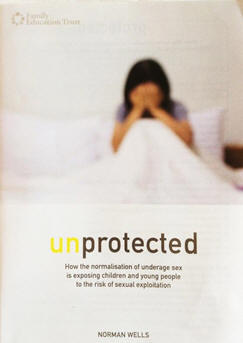Catholic Medical Quarterly Volume 67(3) August 2017
Unprotected: How the Normalisation of Underage Sex is Exposing Children and Young People to the Risk of Sexual Exploitation. By Norman Wells, Family Education Trust
Reviewed By Pravin Thevathasan
 Norman Wells, Director of the excellent Family Education Trust, has
written an important report based on findings from a series of serious
case reviews following revelations of systematic child abuse in English
towns and cities during the last few years. He concludes that underage
sexual activity had come to be viewed as a normal part of growing up. The
notion that children have sexual "rights" had undermined parental
responsibility for the care and protection of their children.
Norman Wells, Director of the excellent Family Education Trust, has
written an important report based on findings from a series of serious
case reviews following revelations of systematic child abuse in English
towns and cities during the last few years. He concludes that underage
sexual activity had come to be viewed as a normal part of growing up. The
notion that children have sexual "rights" had undermined parental
responsibility for the care and protection of their children.
For example, the Rochdale Borough Safeguarding Children Board published a report that concluded that "the drive to reduce teenage pregnancy, whilst commendable in itself, is believed to have contributed to a culture whereby professionals may have become inured to early sexual activity in young teenagers." Professionals had become more concerned about stopping children from getting pregnant than stopping them from being raped. There was a certain complacency about underage sexual activity and the perpetrators of these crimes would surely have sensed this.
In Rotherham, "children as young as 11 were deemed to be having consensual sexual intercourse when in fact they were being raped and abused by adults." The assumption was that sexual activity is consensual in the absence of significant age disparity. There had been a professional readiness to provide contraception to children under the age of consent and there was little consideration of the possibility that they were being systematically abused. Children under the age of sixteen were treated as adults, capable of making their own decisions about sexual activity. This seems like the ethical principle of autonomy gone out of control. There had also been a tendency to dismiss the concerns of parents.
Do confidentiality policies actually serve the best interests of children? The serious case reviews raise major questions about this common presumption. In contrast, Department of Health guidance on contraception for under-16s gives the impression that children are free to make an informed choice to engage in unlawful sexual activity below the age of 16. General Medical Council guidance recognises that there can be a conflict between confidentiality and child protection but still insists that children under 16 who are deemed to have sufficient maturity "are entitled to confidential contraception, abortion and sexual health services. The guidance even falls short of advocating the mandatory reporting on sexually active children below the age of 13."
Government guidance to school nurses "is also contributing to the normalisation of unlawful sex under the age of 16 and exposing children and young people to increased risk of sexual exploitation and abuse."
Lucy Allan, MP for Telford, has observed: "Too often, assumptions were made that young girls were making choices to have regular underage sex. We see, for example, GPs handing out morning-after pills to the same young girls week after week, without questions, simply assuming that it is a choice the girls are making."
The report examines the use of the Brook Sexual Behaviours Traffic Light Tool, which gives young people below the age of 16 "positive feedback" when they are deemed to be in consensual sexual relationships. This may lead inadvertently to the condoning and promotion of sexual exploitation and abuse.
The report concludes: "There needs to be a fundamental change in how children and young people are treated, how parental responsibility is understood, how the family unit is regarded, and how the law is administered."
Everyone concerned about the welfare of children needs to read this report.
